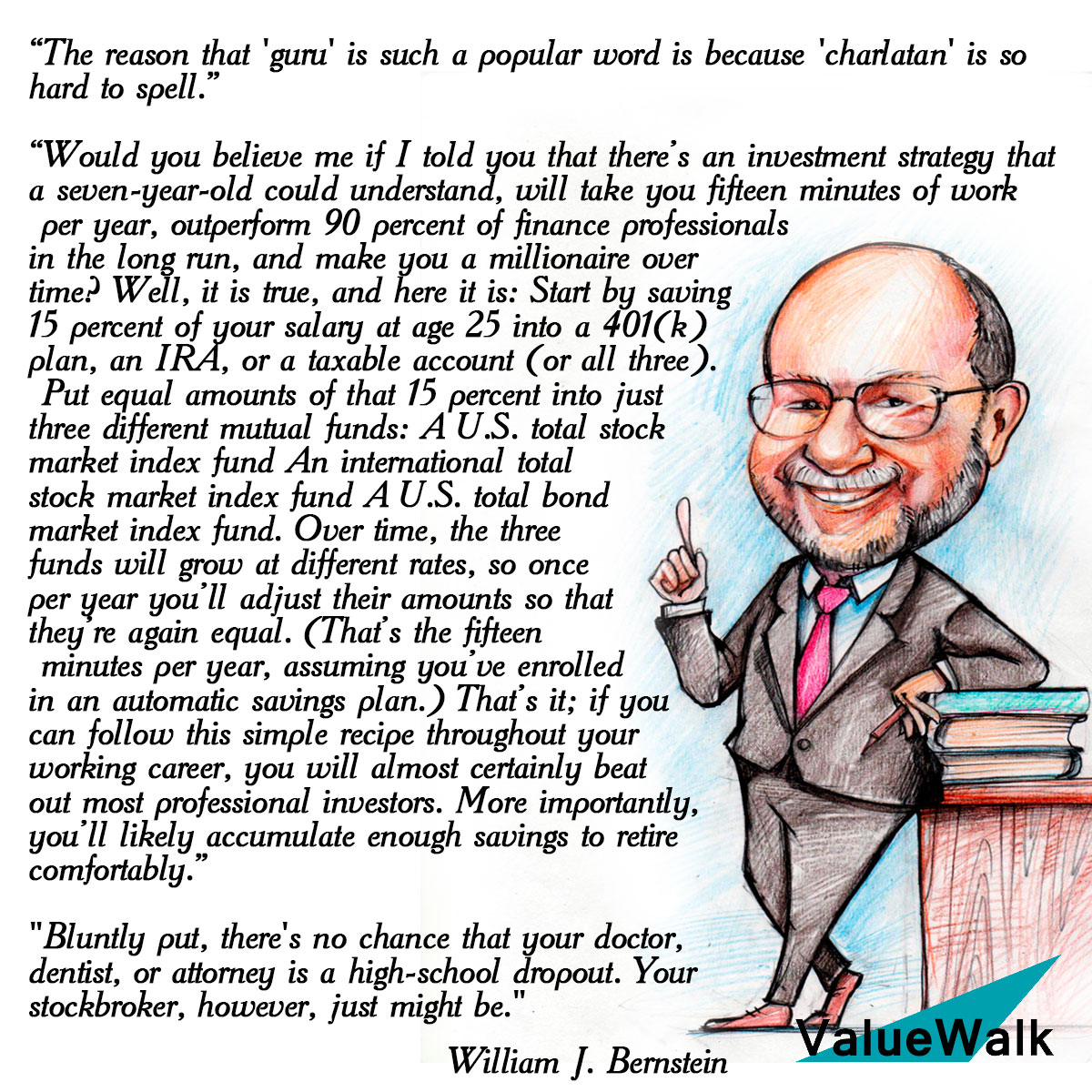Today is a very very special episode with William Bernstein. He is back for another episode in which we discuss his upcoming book, “The Madness of Crowds”. We discuss the history of human irrationality. Dr. Bernstein is a retired neurologist and PhD. He authored many financial books such as “4 Pillars of Investing“, “A Splendid Exchange”, and many more.
Q4 hedge fund letters, conference, scoops etc
The full podcast is available for all readers, the full 10,000 plus word transcript is available below for Hedge Fund Alpha subscribers
 History of Human Irrationality with Bill Bernstein
History of Human Irrationality with Bill Bernstein
Transcript
Good morning, podcast listeners, today is a very special episode, I am joined again with William Bernstein, PhD, MD, he is a retired neurologist and lives in Oregon. He is known for his work on asset allocation and portfolio theory, he runs the Efficient Frontier blog. Dr. Bernstein is also a co-principal in a money management firm, Efficient Frontier Advisors. He also authored many famous financial books, including the Four Pillars of Investing. In today’s episode we will discuss his new project, History of Human Irrationality, the upcoming book is The Madness of Crowds. I want to welcome William to the show and I want to welcome our listeners to a very, very special episode.
Welcome to ValuTalk with Raul.
Right. Yeah, so I just wanted to welcome our listeners to a very special episode, I have William Bernstein and William, welcome to the show.
Glad to be here.
Right. So yeah, last time we spoke you mentioned about Vietnam and I just want to know if you can just tell me about that trip and what you learned during that experience.
There wasn’t a lot to learn, it was basically just a trip to the beach, it was all pleasure. So, you know, we did the things that tourists usually do, we visited the Citadel in Hue and we spent some time in Hoi An which certainly is a very different place now than it was when we first went there 10 years ago. And we spent some time in, you know, Saigon and Ghalat and, you know, had a fine time. It was not meant to be an educational experience.
I see. Alright. Yeah, and so you are working on another book, The History of Human Irrationality, without giving away anything, I just want to know if you can share some of the interesting things you found out during the process.
Well, it’s a wide angle look at irrational human behavior. The genesis of the book starts with another book that was written a century and three-quarters ago, that’s fairly famous in finance called Memoires of Extraordinary Popular Delusions and the Madness of Crowds by a Scotsman named Charles Mackay. And it’s famous for a number of reasons, number one is he probably coined the term, tulipomania. And was the first, at least, English speaking writer who acquainted a popular audience with that particular episode, the famous tulipomania. Now, it turns out he got most of it wrong, but that’s okay, because he certainly acquainted people with financial manias. He had a couple of other chapters on the twin bubbles in the early 18th century that occurred in Paris and London, respectively the Mississippi Company bubble, which was largely the creation of a Scotsman by the name of John Law and of the twin bubble that occurred in London, the echo, if you will, which was the South Sea Bubble. And he brought those to popular conscientiousness as well, and the book, it’s an enormous brick of a book which covers a lot of other things having to do with religion and fashion among other subjects, but it’s famous in finance because it’s been almost, I believe it’s been continuously in print ever since it was first published in 1841.
And if you read the book prior to, for example, the tech bubble in the 1990s, you immediately recognized what was going on and it saved you a lot of money. And I’m not the only person who had that experience, and in fact that episode wasn’t the first episode that it protected you from, Bernard Baruch almost a century before that read the book right after the turn of the 20th century and he immediately recognized what was happening in 1907 as a bubble. And he thought so much of the book that he actually wrote the foreword to the 1932 edition. So this is a book that saved a lot of people a lot of money, at least for those who were fortunate to read it and really understand it. So I decided to update the book in light of a lot of the modern neuropsychology that has been discovered over the past 40 or 50 years. And we understand a lot more about how these episodes occurred, and certainly Mackay did because he didn’t have the benefit of that knowledge. The book itself covers not only finance but it also covers religious manias as well, particularly end times as people who thought the world was imminently coming to an end and suffered because of that belief.
Yeah. Can you tell me more about the religious manias and the common behaviors exhibited?

